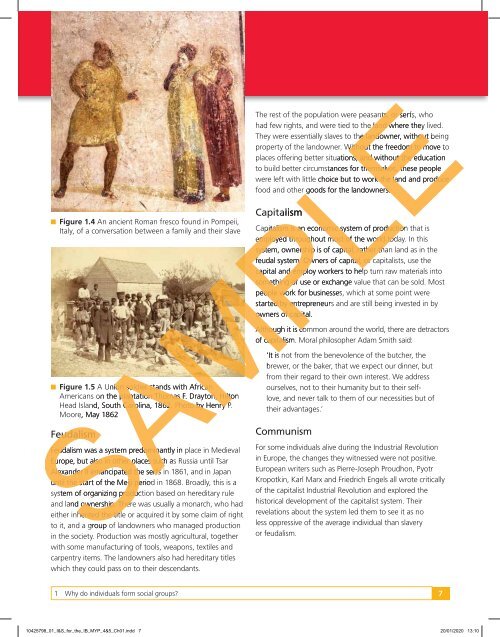Individuals-and-Societies-Sample
You also want an ePaper? Increase the reach of your titles
YUMPU automatically turns print PDFs into web optimized ePapers that Google loves.
The rest of the population were peasants, or serfs,<br />
who<br />
had few rights, <strong>and</strong> were tied to the l<strong>and</strong> where they<br />
lived.<br />
They were essentially slaves to the l<strong>and</strong>owner, without<br />
being<br />
property of the l<strong>and</strong>owner. Without the freedom to move to<br />
places offering better situations, <strong>and</strong> without the education<br />
to build better circumstances for themselves, these people<br />
were left with little choice but to work the l<strong>and</strong> <strong>and</strong> produce<br />
food <strong>and</strong> other goods for the l<strong>and</strong>owners.<br />
<br />
Figure 1.4 An ancient Roman fresco found in Pompeii,<br />
Italy, of a conversation between a family <strong>and</strong> their slave<br />
Capitalism<br />
Capitalism is an economic system of production that is<br />
employed throughout most of the world today. In this<br />
system, ownership is of capital, rather than l<strong>and</strong> as in the<br />
feudal system. Owners of capital, or capitalists, use the<br />
capital <strong>and</strong> employ workers to help<br />
turn raw materials into<br />
something of<br />
use or exchange value that can be sold. Most<br />
people work for businesses, which at some point were<br />
started by entrepreneurs<br />
<strong>and</strong> are still being invested in by<br />
owners of capital.<br />
Although it is common around the world, there are detractors<br />
of capitalism. Moral philosopher Adam Smith said:<br />
<br />
Figure 1.5 A Union soldier st<strong>and</strong>s with African<br />
Americans on the plantation Thomas F. Drayton, Hilton<br />
Head Isl<strong>and</strong>, South Carolina, 1862. Photo by Henry P.<br />
Moore, May 1862<br />
Feudalism<br />
Feudalism was a system predominantly in place in Medieval<br />
Europe, but also in other places such<br />
as Russia until Tsar<br />
Alex<strong>and</strong>er II emancipated the serfs<br />
in 1861, <strong>and</strong> in Japan<br />
until the start of the Meiji period<br />
in 1868. Broadly, this is a<br />
system of organizing production based on hereditary rule<br />
<strong>and</strong> l<strong>and</strong> ownership. There<br />
was usually a monarch, who had<br />
either inherited the title or acquired it by some claim of right<br />
to it, <strong>and</strong> a group of l<strong>and</strong>owners who managed production<br />
in the society. Production was mostly agricultural, together<br />
with some manufacturing of tools, weapons, textiles <strong>and</strong><br />
carpentry items. The l<strong>and</strong>owners also had hereditary titles<br />
which they could pass on to their descendants.<br />
‘It is not from the benevolence of the butcher, the<br />
brewer, or the baker, that we expect our dinner, but<br />
from their regard to their own interest. We address<br />
ourselves, not to their humanity but to their selflove,<br />
<strong>and</strong> never talk to them of our necessities but of<br />
their advantages.’<br />
Communism<br />
For some individuals alive during the Industrial Revolution<br />
in Europe, the changes they witnessed were not positive.<br />
European writers such as Pierre-Joseph Proudhon, Pyotr<br />
Kropotkin, Karl Marx <strong>and</strong> Friedrich Engels all wrote critically<br />
of the capitalist Industrial Revolution <strong>and</strong> explored the<br />
historical development of the capitalist system. Their<br />
revelations about the system led them to see it as no<br />
less oppressive of the average individual than slavery<br />
or feudalism.<br />
1 Why do individuals form social groups? 7<br />
10425798_01_I&S_for_the_IB_MYP_4&5_Ch01.indd 7 20/01/2020 13:10














